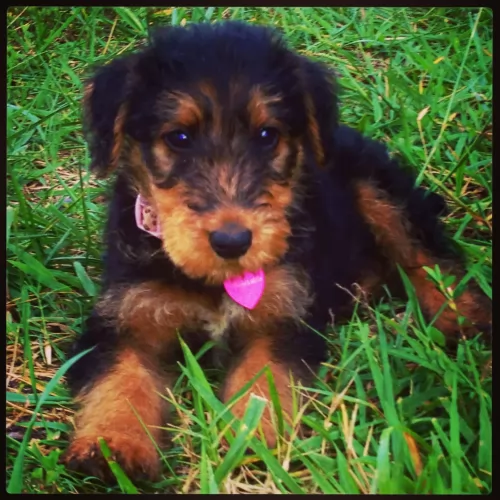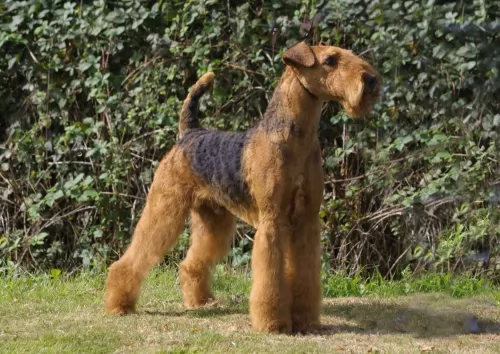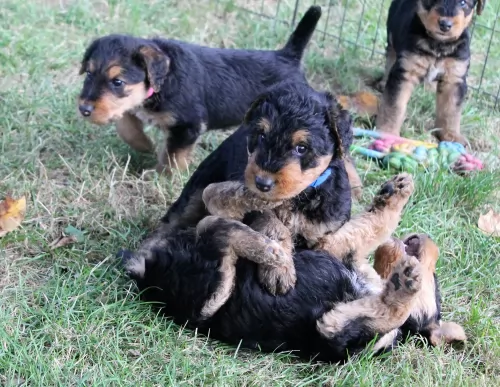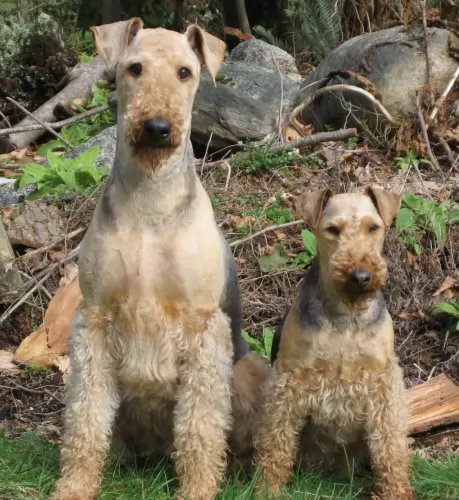 Petzlover
Petzlover Airedale Terrier is originated from United Kingdom but St. John's Water Dog is originated from Canada. Airedale Terrier may grow 8 cm / 4 inches higher than St. John's Water Dog. Airedale Terrier may weigh 12 kg / 26 pounds lesser than St. John's Water Dog. Both Airedale Terrier and St. John's Water Dog has same life span. Airedale Terrier may have more litter size than St. John's Water Dog. Airedale Terrier requires High Maintenance. But St. John's Water Dog requires Low Maintenance
Airedale Terrier is originated from United Kingdom but St. John's Water Dog is originated from Canada. Airedale Terrier may grow 8 cm / 4 inches higher than St. John's Water Dog. Airedale Terrier may weigh 12 kg / 26 pounds lesser than St. John's Water Dog. Both Airedale Terrier and St. John's Water Dog has same life span. Airedale Terrier may have more litter size than St. John's Water Dog. Airedale Terrier requires High Maintenance. But St. John's Water Dog requires Low Maintenance
 Airedale terrier got its name from a small river Aire in Leeds area in Great Britain. First information about Airedale terrier originates back in 1850. This breed was used as otter hunters. Airedale terrier was invented by mixing Otterhound, old English terrier, and a white bull-terrier. Airedale was used primarily for hunting otters, deer, or wild boars. Not just that, Airedale was a very good guard dog. During the war, this breed was used for delivery and it showed a lot of courage. One Airedale terrier even received a medal for its bravery in World War I. Today it is used as an official dog of National Police of Britain.
Airedale terrier got its name from a small river Aire in Leeds area in Great Britain. First information about Airedale terrier originates back in 1850. This breed was used as otter hunters. Airedale terrier was invented by mixing Otterhound, old English terrier, and a white bull-terrier. Airedale was used primarily for hunting otters, deer, or wild boars. Not just that, Airedale was a very good guard dog. During the war, this breed was used for delivery and it showed a lot of courage. One Airedale terrier even received a medal for its bravery in World War I. Today it is used as an official dog of National Police of Britain.
 The breed known as the St. John’s water dog is an extinct landrace breed. They were domestic dogs found in Newfoundland and at times were called the lesser Newfoundland. There is not much information available about the other breeds that went into its development. Hypothetically it is believed they are a mix of the Irish, Old English and Portuguese dogs bred to work.
The breed known as the St. John’s water dog is an extinct landrace breed. They were domestic dogs found in Newfoundland and at times were called the lesser Newfoundland. There is not much information available about the other breeds that went into its development. Hypothetically it is believed they are a mix of the Irish, Old English and Portuguese dogs bred to work.
It is also thought that other breeds in their family tree, descending from them, include the Golden Retriever, the Flat-Coated Retriever, the Chesapeake Bay Retriever, the Labrador and the Curly-Coated Retriever. The Newfoundland is also related to the St. Johns Water Dog through the line of Rafeirio do Alenteios that Portuguese fisherman brought to the island.
The breed was exported to England in the 19th century and early 20th. There the breeds of retrievers were developed. In Canada during this time frame restrictions were placed on dog ownership in order to encourage people to raise sheep. At the same time England imposed a long quarantine on all animals coming into the country in order to get rid of rabies. These two factors contributed greatly to the extinction of the breed. It seems the last two dogs were seen in a remote area in the 1980’s. All attempts to save the breed failed.
 Average height of Airedale terrier is approximately 56-61cm, while their average weight is 20-29kg. Females are slightly smaller than male dogs.
A lifespan of an Airedale terrier variates and depends on the health of the dog but the average lifespan of this breed is 10-12.
Litter Size of the Airedale terrier is approximately 8-9 puppies.
Other Names Waterside Terrier, Bingley Terrier, King of Terriers
Average height of Airedale terrier is approximately 56-61cm, while their average weight is 20-29kg. Females are slightly smaller than male dogs.
A lifespan of an Airedale terrier variates and depends on the health of the dog but the average lifespan of this breed is 10-12.
Litter Size of the Airedale terrier is approximately 8-9 puppies.
Other Names Waterside Terrier, Bingley Terrier, King of Terriers
 St. John’s Water Dog is strong, medium sized and stocky. They looked more like English Labs than American Labs. They had a thick, short coat, loved swimming, had a lot of endurance and rudder tail. It was also described as a thin, black dog with short hair. They had white patches on their chest and feet. His nose was thin and tapered, his legs powerful, his chest muscular. The breed is quick, swims, runs quickly and is a fighter as well.
St. John’s Water Dog is strong, medium sized and stocky. They looked more like English Labs than American Labs. They had a thick, short coat, loved swimming, had a lot of endurance and rudder tail. It was also described as a thin, black dog with short hair. They had white patches on their chest and feet. His nose was thin and tapered, his legs powerful, his chest muscular. The breed is quick, swims, runs quickly and is a fighter as well.
Never accepted by any major kennel club except as a foundation breed. They became extinct.
 Airedale terrier is an amazing and playful dog. They are very intelligent, hard-working, and athletic dogs. This breed has a lot of energy and stamina, so regular activity is a must for this breed. They are independent thinkers which can be challenging sometimes, but overall, if they have enough activity they are amazing and goofy pets.
Airedale terrier is an amazing and playful dog. They are very intelligent, hard-working, and athletic dogs. This breed has a lot of energy and stamina, so regular activity is a must for this breed. They are independent thinkers which can be challenging sometimes, but overall, if they have enough activity they are amazing and goofy pets.
It is not recommendable to leave your dog for a long period of time because it will get bored, and when it’s bored, they tend to become destructive. You don’t want to see destroyed home when you come back from work.
Airedale terrier is great watchdog too. They will protect family if it is necessary, but overall they are very friendly. They are very sensitive and gentle with kids. Also, with a proper socialization of the dog, they are very friendly towards another animal too.
Basically, the temperament of your Airedale terrier depends on training, socialization, and genes. If you properly train your dog, with good socialization you won’t be having any problems.
 Airedale terrier is generally a very healthy dog, but as almost any breed, they can have some health issues. Hip dysplasia, cancer, and allergies can cause problems with this breed. You have to be very careful when choosing a perfect dog for you. Examine the family tree to avoid the possible genetic flaws.
Airedale terrier is generally a very healthy dog, but as almost any breed, they can have some health issues. Hip dysplasia, cancer, and allergies can cause problems with this breed. You have to be very careful when choosing a perfect dog for you. Examine the family tree to avoid the possible genetic flaws.
Airedale terrier will be a healthy dog if you take a proper care, and with regular vet checks, there shouldn’t be any problems.
 There is no documented history of any genetic or hereditary illnesses in the breed. However, it seems rational to believe they suffered from ailments similar to Labradors and newfoundland though they are smaller dogs.
There is no documented history of any genetic or hereditary illnesses in the breed. However, it seems rational to believe they suffered from ailments similar to Labradors and newfoundland though they are smaller dogs.
 Airedale feeding depends on how much daily activity has. Overall, for an average Airedale 1.5-2.5 cups of high-quality dry food, divided into a 2 meals is recommendable. It is better than leaving the whole food out all the time. Then again, if your dog is not very active or active more than an average dog, feeding should be organized for your dog’s needs.
Airedale feeding depends on how much daily activity has. Overall, for an average Airedale 1.5-2.5 cups of high-quality dry food, divided into a 2 meals is recommendable. It is better than leaving the whole food out all the time. Then again, if your dog is not very active or active more than an average dog, feeding should be organized for your dog’s needs.
Airedale puppies should eat more than an adult dog. 3-5 meals per day are an optimal measure. Puppies need more meals per day for better development. Also, giving your puppy minerals and vitamins would improve overall health when it is fully grown dog.
Airedale has a very interesting coat. The coat has two layers, topcoat which is strong, and undercoat which is soft. They do not shed a lot, but twice a year they shed more than the rest of the time. It is not very hard to groom Airedale terrier. Brushing is recommended once or twice a week. You can also bath your Airedale but not very often. Airedale doesn’t require trimming, but some owners decide to do that. It is up to you if you want to trim your dog.
 1Feeding the puppy – Don’t overfeed – they have a propensity toward obesity. Feed high quality, high protein 3 x a day.
1Feeding the puppy – Don’t overfeed – they have a propensity toward obesity. Feed high quality, high protein 3 x a day.
2.Feeding the adult – Don’t overfeed. Feed a high quality, high protein 1-2 x a day.
4. Games and Exercises – They need space to run and they love to explore. They would also love to be near water where they could swim. Good at dock diving, field trials, flyball and frisbee.